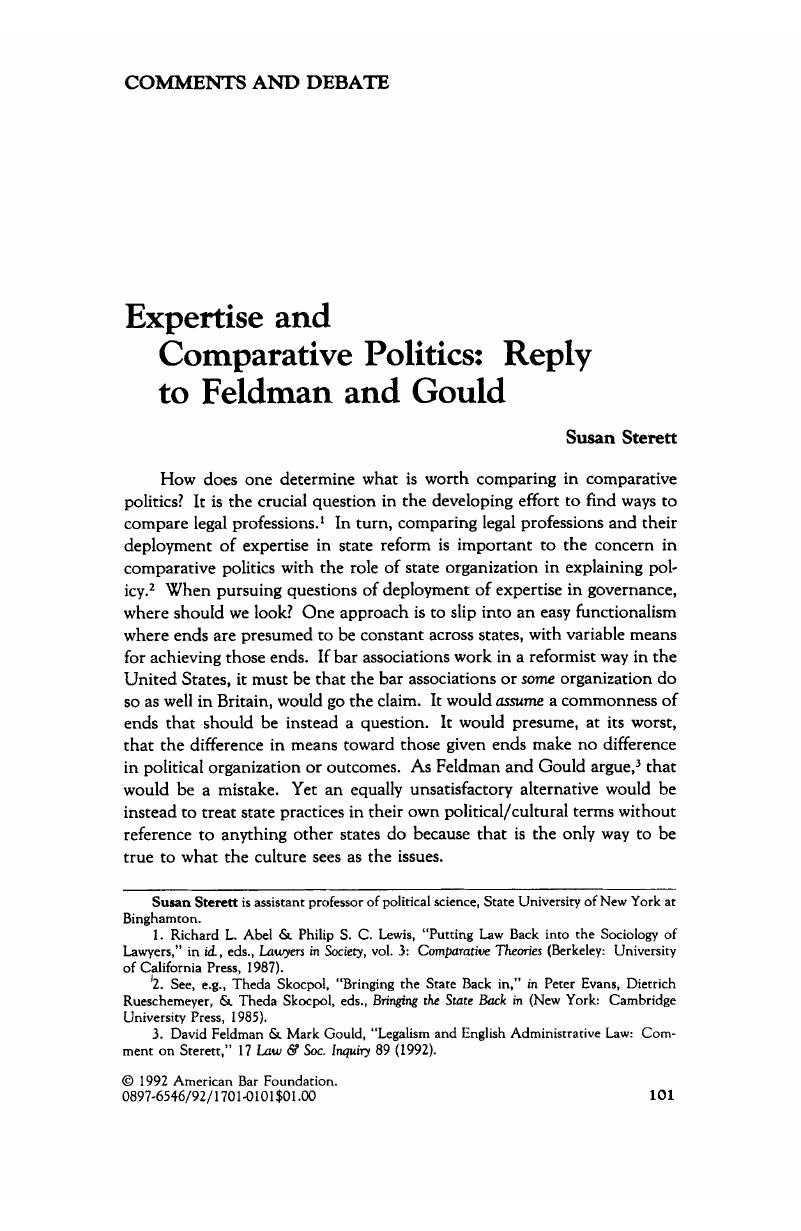Article contents
Expertise and Comparative Politics: Reply to Feldman and Gould
Published online by Cambridge University Press: 27 December 2018
Abstract

- Type
- Comments and Debate
- Information
- Copyright
- Copyright © American Bar Foundation, 1992
References
1 Richard L. Abel & Philip S. C. Lewis, “Putting Law Back into the Sociology of Lawyers,” in id., eds., Lawyers in Society, vol. 3: Comparative Theories (Berkeley: University of California Press, 1987).Google Scholar
2 See, e.g., Skocpol, Theda, “Bringing the State Back in,”in Peter Evans, Dietrich Rueschemeyer, & Theda Skocpol, eds., Bringing the State Back in (New York: Cambridge University Press, 1985).Google Scholar
3 Feldman, David & Gould, Mark, “Legalism and English Administrative Law: Comment on Sterett,” Law & Soc. Inquiry. 17 89 (1992).CrossRefGoogle Scholar
4 Magali Sarfatti Larson, “The Production of Expertise and the Constitution of Expert Power,”in Thomas Haskell, ed., The Authority of Experts (Bloomington: Indiana University Press, 1984).Google Scholar
5 Terence C. Halliday, Beyond Monopoly (Chicago: University of Chicago Press, 1987); Michael Powell, From Patrician to Professional Elite (Chicago: University of Chicago Press, 1988).Google Scholar
6 Much of that discussion or simply action goes on internally to administration in the United States as well. Suzanne Weaver, Decision to Prosecute (Cambridge, Mass.: MIT Press, 1981); R. Shep Melnick, Regulation and the Courts (Washington, D.C.: Brookings Institution, 1983); Terry Moe, “Interests, Institutions, and Positive Theory: The Politics of the NLRB,” 2 Stud. Am. Pol Develop. 236 (1987).Google Scholar
7 Susan Sterett, “Legality in Britain and the United States: Toward an Institutional Explanation,”Comp. Pol. Stud. (forthcoming).Google Scholar
8 Arthur Stinchcombe, Constructing Social Theories (Chicago: University of Chicago Press, 1968).Google Scholar
9 Padfield v. Minister of Agriculture, Fisheries and Food [1968] A.C. 997; Ridge v. Baldwin [1964] A.C. 40.Google Scholar
10 Council of Civil Service Unions v. Minister for Civil Service [1984] 3 All E.R. 935.Google Scholar
11 Bromley L.B.C. v. Greater London Council [1982] 2 W.L.R. 62.Google Scholar
12 British Oxygen v. Board of Trade [1971] A.C. 610.Google Scholar
13 JUSTICE/All Souls Committee on Administrative Law in the United Kingdom, Administrative Justice: Some Necessary Reforms (Oxford: Oxford University Press, Clarendon Press, 1988).Google Scholar
14 Id. at 150–57.Google Scholar
15 Harry Woolf, Protecting the Public: The New Challenge (London: Hamlyn Trust, 1990).Google Scholar
16 Theda Skocpol & Margaret Somers, “The Uses of Comparative History in Macrosocial Inquiry,” 22 Comp. Stud. Soc'y & Hist. 174 (1980).CrossRefGoogle Scholar
- 1
- Cited by


